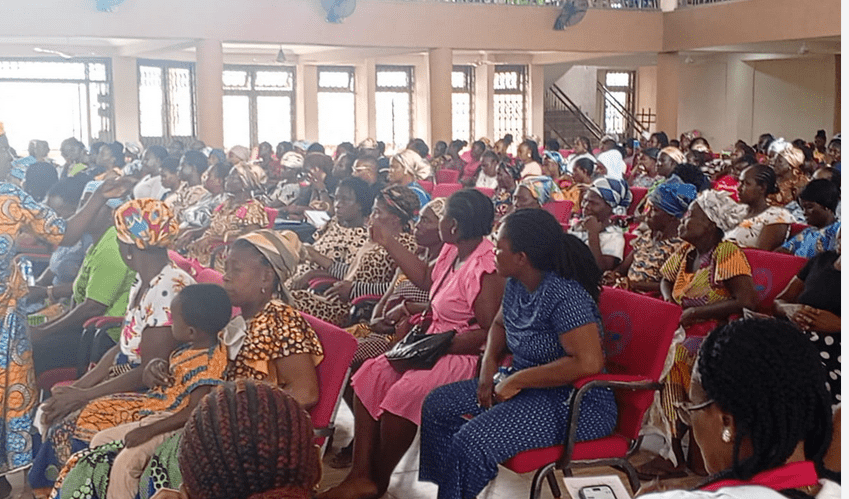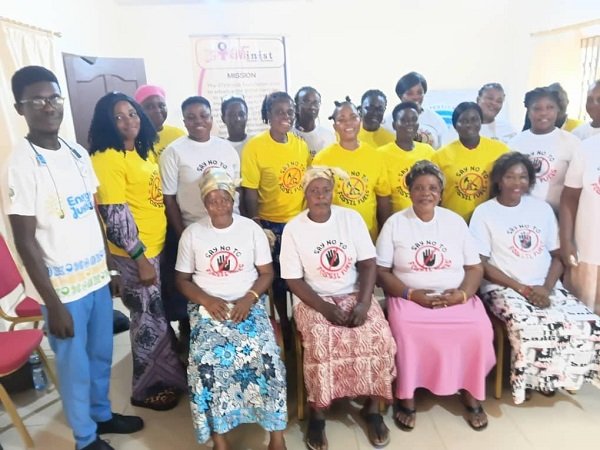Gender
Guzakuza WAW Ghana 2025 calls for gender equity in agribusiness

Stakeholders at the launch of Women in Agribusiness Week 2025, have urged bold action to address gender disparities in agriculture, stressing that women’s empowerment is critical to food security, rural development, and inclusive economic growth.
The Women in Agribusiness Week (WAW) Ghana 2025, organised by Guzakuza-a leading organisation committed to empowering women in agribusiness across Africa—was launched in Koforidua in the Eastern Region, bringing together policymakers, entrepreneurs, and advocates.
Addressing this year’s Women in Agribusiness Week theme: “Innovating for a Resilient Agribusiness: Finance, Technology and Market Access for Growth”, stakeholders took turns to highlight the need for innovation, equity, and investment to unlock the full potential of Ghanaian women in agribusiness.
Hajia Habiba Yusifu, Eastern Regional Director of Agriculture, described women as “the lifeline of rural and national economies,” but noted that they continue to face systemic barriers.
“For decades, African women have been trapped in poverty cycles due to unequal access to education, resources, and technology,” she said.
Adding, “Empowering women in agriculture is not only a moral imperative but also an economic necessity.”
She cited research indicating that closing the gender gap could significantly boost agricultural productivity, reduce hunger, and stimulate economic growth.
“We must provide women with equal access to land, finance, and modern technologies to enable them to become catalysts for innovation, productivity, and sustainable development,” she added.
Hajia Yusifu also called for increased representation of women in farmer cooperatives and decision-making platforms.
“Women’s voices must be heard and their perspectives considered when designing programmes that affect their livelihoods,” she said.
In a speech read on her behalf, Eastern Regional Minister, Mrs Rita Akosua Adjei Awatey, echoed the appeal, noting that women constitute 70 per cent of Ghana’s agricultural workforce but face challenges in scaling their businesses.
“Access to affordable credit and investment is vital for women to transition from subsistence farming to commercial agribusiness,” she said.
She highlighted government interventions under the Agriculture for Economic Transformation Agenda, including the Feed Ghana Programme and the Grains and Legumes Development Programme, which aim to enhance resilience and productivity.
“Our efforts in agriculture are not only about producing more food, but also about building resilience and ensuring that farmers, particularly women, can withstand climate change and market fluctuations,” she said.
Ms Vida Akuamoah Boateng, Project Officer at Guzakuza, said the conference provided a platform for product marketing, networking, and knowledge exchange.
“Industry experts add knowledge that enhances creativity, and through networking, women can support each other long after the event,” she said.
She acknowledged persistent challenges such as limited access to finance, land ownership, and fragile market access.
“That is why we organise exhibitions—to encourage women to add value to their produce and connect them with buyers,” she said.
She also emphasized the importance of agro-processing, noting, “We are still in the early stages of value addition. We encourage women to go into processing to make their products competitive locally and internationally.”
Mrs Perpetual Kyei, Executive Director of Guzakuza, said her organisation has built a pan-African ecosystem for women entrepreneurs in agribusiness.
“Our flagship Ignite programme has trained over 5,000 women from 36 countries since 2015,” she said. “We continue to connect alumni to collaborate and grow.”
Since 2015, Guzakuza has launched programmes such as Ignite, SheFarms, and the continental Women in Agribusiness Week (WAW Africa).
While WAW Africa 2025 will be hosted in Uganda, the Ghana edition marks the first national platform of its kind dedicated to women in agribusiness.
This year’s WAW Ghana was held in partnership with MTN Momo, Ghana Standards Authority, Ghana Export Promotion Authority, Environmental Protection Agency, Ministry of Trade, Agribusiness and Industry, and the Association of Ghana Industries.
Exhibitors showcased processed foods, packaged staples, cosmetics, and beverages produced by women-led enterprises.
Organisers said the programme rotates annually across Ghana to ensure broad participation.
A continental edition, WAW Africa, is scheduled for November, bringing together women entrepreneurs from across Africa to share innovations and expand market access. -GNA
Join our WhatsApp Channel now!
https://whatsapp.com/channel/0029VbBElzjInlqHhl1aTU2

Gender
Workshop to deepen coverage of gender-based issues held in Accra
A training and capacity-building workshop was held on Thursday for the media to intensify coverage on gender-based issues to support women’s participation in leadership and governance in Accra.
The workshop, held under the theme ‘Strengthening Advocacy for the Implementation of Ghana’s Affirmative Action (Equity) Law, 2024 – The Case of the Media’, brought together journalists from selected media houses.
The Convener of the Affirmative Action (AA) Law Coalition, Ms Sheila Minka-Premo (Esq.), stressed that the media has a critical responsibility to educate the public on the importance of the Affirmative Action Act, noting that sustained and informed reporting would strengthen advocacy and support the effective implementation of the law.
While commending both the Legislature and the Executive for the passage and presidential assent of the Affirmative Action Bill into law, the AA Law Coalition Convener appealed to government to address existing gaps. These include the constitutional provision of 30 per cent women’s representation in politics, inadequate policy frameworks to advance affirmative action, and weak compliance by state institutions.
She charged the media to highlight and promote the role of women in leadership and to actively support a smooth and effective implementation process of the Act.
In her welcome address, Executive Director of ABANTU for Development, Dr Rose Mensah-Kutin, said the training sought to strengthen journalists’ advocacy skills to enable them to educate the public on the provisions and significance of the law.
Dr Mensah-Kutin commended ActionAid Ghana for supporting the advocacy efforts, urging the media to prioritise the law to ensure its sustainability.
The Affirmative Action (Gender Equity) Act, 2024 (Act 1121) was passed by Parliament in July 2024 and received presidential assent in September 2024, following years of sustained advocacy by women’s rights organisations, gender activists, and other stakeholders.
By Linda Abrefi Wadie
Join our WhatsApp Channel now!
https://whatsapp.com/channel/0029VbBElzjInlqHhl1aTU27

Gender
STEMinist Foundation, Keta Ramsar centre train women on rights, leadership

STEMINIST Foundation, Ghana, a Non-Governmental Organisation (NGO) with support from Keta Ramsar Centre has trained about 25 women selected from the Keta Municipality on the rights of women and how to use them for their voices to be heard in their communities.
STEMinist Foundation, Ghana, is a network of women advocating equal opportunities through excellent representation of women in Science, Technology, Engineering and Mathematics (STEM).
The women, mostly fishmongers and other self-styled workers, were taken through topics such as Understanding Energy and Climate Justice, Fossil Gas Expansion, Livelihoods’ Care Work and Health, Women Leadership, and Power Building among others.
Mrs Nerissa Edem Anku, Gender Justice Transition Advisor of the Foundation, noted that the theme “Energy Justice: Empowering Women with Power, Rights and Dignity,” was chosen for the women to reconnect, reflect, and look ahead in shaping their rights as women.
She stated that women have been relegated to the background in the communities when it comes to decision making, stressing the need to correct that for them to know they have rights to fight for themselves.
Mrs Nerissa Edem Anku further noted that women in fishing communities wanted to see real and tangible improvements in their living conditions, spearheaded by government to prevent unhealthy confrontations with the local people.
She assured that the NGO would continue to strengthen its programmes to ensure that women were empowered to contribute meaningfully to the socio-economic development of their families, communities, and the nation.
Miss Portia Adu-Mensah, Facilitator, Community Mobilisation Communicator, on her part added that all stakeholders have to adopt more innovative steps to build an environment in which women can thrive. That, she said, would win the confidence of the women and promote more inclusive partnerships.
The Assemblywoman for Dzelukope, Ruby Adukpoh, on behalf of the women thanked the NGO for the gesture and reaffirmed their commitment to strengthening their collective voices and influence in shaping policies that will affect them.
From Kafui Gati, Keta
Join our WhatsApp Channel now!
https://whatsapp.com/channel/0029VbBElzjInlqHhl1aTU27







